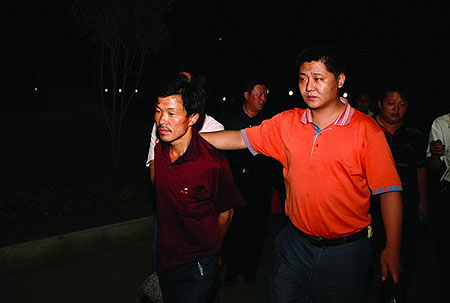Slave-labor boss detained amid national shock
(Agencies/chinadaily.com.cn)
Updated: 2007-06-17 16:19
Yang began the Herculean task of visiting the more than 100 kilns in Shanxi
in early April. But she couldn't see her son. Instead, what she saw was
horrifying. "In most of the kilns, children were being forced to work beyond
their physical capacity. Some children were still in their school uniforms. When
they could not carry on with the inhuman task of pushing massive carts full of
bricks anymore, they were whipped by the taskmasters," she says. Many children
had wounds on their feet and around their waist.
Yang tried to save some of the boys who secretly begged her to take them
away. But the kiln owners told her she dared not try it if she wanted to leave
the place safe and sound.
She then pleaded with the local government to help rescue the children, but
received little help. That's when the parents sought the media's help last
month. After the expose, police raided the Caosheng Village kiln in Hongtong and
freed 31 workers, with the youngest being 14.
But much before the police launched the operation, a greater tragedy had
already struck. A worker named Liu Bao died after being hit with a shovel in
November and was buried without proper documentation. Police have detained kiln
foreman Heng Tinghan, owner Wang Bingbing and three of his hired hoodlums.
Even with the rescue operation in progress, many parents fear, as Yang says,
that their children might have been shifted to other provinces or hidden in
remote mountainous areas to avoid detection. "We saw at least 200 to 300 child
laborers, but only about 50 have been freed," Yang says. "Where are the others?"
|
|

|
Heng Tinghan (L), accused of holding
workers in virtual slavery in a kiln in Hongtong country in
northern province of Shanxi, is in caught in
Shiyan, central China's Hubei Province on Saturday, June
16, 2007. [Shiyan Evening News]
 | |
|
That is also the question on almost every shocked citizen's lips. People have
criticized government officials for their indifference and blamed corruption for
the delay in freeing the laborers. "We've appealed to police but received little
help," say the 400 fathers in an online petition. "Some officers even prevented
us from saving children that were not ours. They told us to mind our own
business."
Some officials were reportedly involved in the trafficking. Zhu Guanghui, a
16-year-old boy who was freed from one of the kilns, told reporters that a labor
inspector had sold him for 300 yuan ($40). It has come to light that many of
these kilns had connections with local governments. The Hongtong kiln, for
instance, is in the courtyard of Wang Dongji, the Communist Party secretary of
the village, and its owner Wang Bingbing is his son.
Many people and the media have been asking why police swung into action only
after the central leadership's order. The People's Daily, in a scathing report,
has said: "Dereliction of (duty of officials in) local government departments
and collusion between officials and criminals is clear."
Other reports have said human trafficking started about 10 years ago in
central China, and gained momentum in recent years, with organized gangs being
involved. Investigations have shown the "trade" began with traffickers and
middlemen, who trapped people at railway stations and long-distance bus
terminals with the allure of high-paid jobs in big cities. Boys aged around 16
were the most sought after because they were old enough to work and easy to
control.
After they were abducted or lured into a trap, they used to be kept in a room
near the stations or terminals and sent in groups of five or six to cities such
as Linfen, Yuncheng and Jincheng in Shanxi where most of the illegal kilns were
concentrated.
As soon as the slave laborers reached the kilns, the owners used to seize
their luggage and identity certificates.
They gave them new names, too, to mislead parents who came looking for their
children.
Such sad stories could be repeated if the government doesn't set up a
foolproof law enforcement mechanism at the grass-roots level, which it has vowed
to do, and take every possible measure to narrow the rich and poor
divide.
| Most Commented/Read Stories in 48 Hours |
|
|
|


